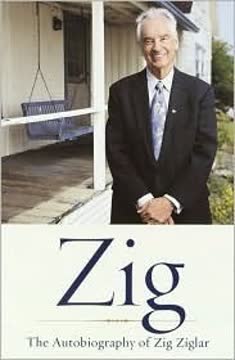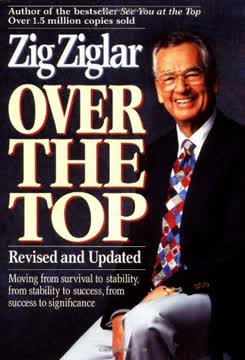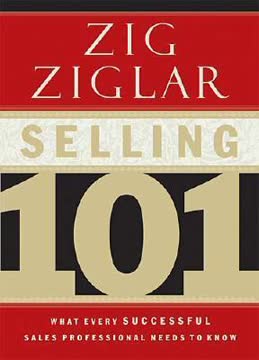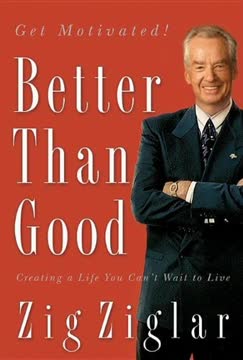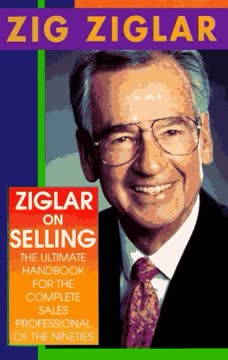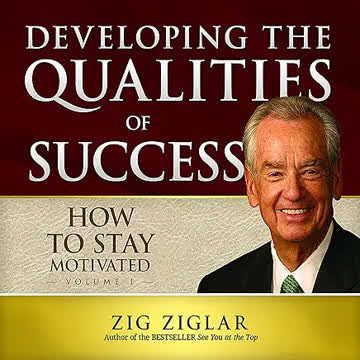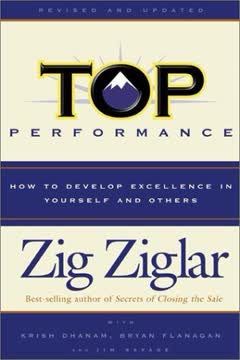Key Takeaways
1. From Poverty to Purpose: Overcoming Adversity Through Faith and Hard Work
"My story is proof that you can start anywhere and get to where you want to go."
Humble beginnings. Zig Ziglar's journey from poverty in Yazoo City, Mississippi, to becoming a renowned motivational speaker and author exemplifies the power of perseverance and faith. Born into a family of twelve children, Ziglar faced numerous challenges, including the loss of his father at a young age and financial struggles during the Great Depression.
Overcoming obstacles. Despite these hardships, Ziglar developed a strong work ethic from an early age, taking on various jobs to support his family. His experiences selling newspapers, working in grocery stores, and eventually becoming a successful cookware salesman laid the foundation for his future success.
Faith as a cornerstone. Throughout his life, Ziglar's faith played a crucial role in shaping his outlook and driving him forward. His mother's unwavering belief in God and her teachings instilled in him the values of honesty, integrity, and perseverance that would guide him throughout his career.
2. The Power of Positive Thinking: Transforming Your Mindset for Success
"You can have everything in life you want if you will just help enough other people get what they want."
Attitude is everything. Ziglar's philosophy emphasizes the importance of maintaining a positive attitude in the face of adversity. He believed that success is largely determined by one's mindset and approach to challenges.
Practical applications. Ziglar developed numerous techniques for cultivating a positive outlook, including:
- Daily affirmations and goal-setting
- Surrounding oneself with positive influences
- Reframing negative experiences as opportunities for growth
- Practicing gratitude and focusing on life's blessings
The ripple effect. By adopting a positive mindset, Ziglar found that not only did his own life improve, but he was also able to positively impact the lives of others. This realization became the cornerstone of his motivational speaking career and his approach to helping others achieve success.
3. Building a Strong Foundation: The Importance of Family and Relationships
"I don't need to tell you . . . we bought the house!"
Family first. Throughout his life, Ziglar emphasized the importance of strong family relationships as the foundation for personal and professional success. His marriage to Jean, whom he affectionately called "the Redhead," served as a model for the kind of loving, supportive partnership he advocated.
Balancing work and family. Despite a demanding career that often required extensive travel, Ziglar made conscious efforts to prioritize his family:
- Making "airport calls" to stay connected with his children
- Planning family vacations and special outings
- Involving his family in his work when possible
Legacy of love. Ziglar's commitment to family extended beyond his immediate circle, influencing his approach to business and his teachings. He encouraged others to invest in their relationships, recognizing that true success encompasses not just professional achievements, but also personal fulfillment and strong connections with loved ones.
4. Embracing Continuous Learning: Education as a Lifelong Journey
"You don't have to be great to start, but you have to start to be great."
Formal and informal education. Despite not completing college, Ziglar was a lifelong learner who valued education in all its forms. He emphasized the importance of continual self-improvement through reading, attending seminars, and seeking out mentors.
Learning from experience. Ziglar's diverse career experiences, from selling cookware to becoming a motivational speaker, provided valuable lessons that he incorporated into his teachings. He believed that every experience, whether positive or negative, offered an opportunity for growth and learning.
Sharing knowledge. As his career progressed, Ziglar became passionate about sharing his knowledge with others. He developed numerous courses and seminars, wrote books, and created audio programs to help others learn and grow. His "I Can" character-building course for schools exemplified his commitment to education and personal development.
5. The Art of Selling: Techniques for Success in Business and Life
"You can get everything in life you want if you will just help enough other people get what they want."
Sales as a foundation. Ziglar's early career in sales, particularly his success in selling cookware, laid the groundwork for his future as a motivational speaker and author. He recognized that the principles of effective selling could be applied to many aspects of life.
Key sales techniques:
- Building rapport and trust with customers
- Identifying and addressing customer needs
- Overcoming objections with empathy and understanding
- Following up and providing excellent customer service
Beyond traditional sales. Ziglar's approach to sales extended beyond mere transactions. He emphasized the importance of genuinely helping others and providing value, which he believed was the key to long-term success in both business and personal relationships.
6. Finding Your Calling: Discovering and Pursuing Your Passion
"You were born to win, but to be a winner, you must plan to win, prepare to win, and expect to win."
Exploring opportunities. Ziglar's journey to becoming a motivational speaker wasn't straightforward. He explored various career paths, including sales, insurance, and multilevel marketing, before finding his true calling.
Recognizing potential. It was through the encouragement of others, particularly his early speaking engagements for Mary Kay Cosmetics, that Ziglar began to recognize his talent for inspiring and motivating others.
Commitment to growth. Once Ziglar identified his passion for public speaking and personal development, he committed himself fully to honing his craft. He continuously worked on improving his speaking skills, developing new material, and expanding his reach through books, audio programs, and seminars.
7. The Impact of Mentorship: Learning from Those Who Came Before
"You don't have to be great to start, but you have to start to be great."
Recognizing influential figures. Throughout his life, Ziglar acknowledged the significant impact that mentors and role models had on his personal and professional development. He credited individuals such as P.C. Merrell, John R. Anderson, and Cavett Robert with providing crucial guidance and support.
Key lessons from mentors:
- The importance of believing in oneself
- The value of hard work and perseverance
- The power of a positive attitude
- The significance of integrity in business and personal life
Paying it forward. As Ziglar's own success grew, he became committed to mentoring others and sharing the wisdom he had gained. He believed strongly in the responsibility of successful individuals to help others achieve their goals.
8. Overcoming Setbacks: Turning Failures into Opportunities
"Failure is an event, not a person."
Embracing failure as a teacher. Throughout his career, Ziglar experienced numerous setbacks and failures. However, he viewed these experiences not as defeats, but as valuable learning opportunities that ultimately contributed to his success.
Key strategies for overcoming setbacks:
- Maintaining a positive attitude in the face of adversity
- Analyzing failures to identify areas for improvement
- Seeking support from family, friends, and mentors
- Persevering and refusing to give up on one's goals
The power of resilience. Ziglar's ability to bounce back from setbacks, including financial difficulties and career changes, demonstrated the importance of resilience in achieving long-term success. He encouraged others to develop this quality by focusing on their goals and maintaining faith in their abilities.
9. The Value of Integrity: Living a Life of Honesty and Authenticity
"With integrity, you have nothing to fear, since you have nothing to hide."
Commitment to authenticity. Ziglar placed a high value on living an honest and authentic life. He believed that true success could only be achieved when one's public persona aligned with their private actions and beliefs.
Practical applications of integrity:
- Keeping promises and commitments
- Being honest in business dealings
- Treating others with respect and fairness
- Taking responsibility for one's actions and mistakes
Leading by example. Ziglar's commitment to integrity extended beyond his personal life to his business practices and teachings. He emphasized the importance of ethical behavior in all aspects of life, believing that it was not only the right thing to do but also the foundation for long-term success and fulfillment.
10. Giving Back: The Importance of Service and Making a Difference
"You can have everything in life you want if you will just help enough other people get what they want."
Service as a core value. Throughout his career, Ziglar emphasized the importance of giving back and making a positive difference in the lives of others. He believed that true success was measured not just by personal achievements, but by the impact one had on their community and the world.
Ways to give back:
- Volunteering time and resources to charitable causes
- Mentoring and supporting others in their personal and professional growth
- Using one's platform and influence to raise awareness for important issues
- Donating to causes aligned with one's values
The reciprocal nature of giving. Ziglar found that the more he focused on helping others, the more fulfillment and success he experienced in his own life. This principle became a cornerstone of his teachings, encouraging others to adopt a service-oriented mindset as a path to personal and professional growth.
Last updated:
FAQ
1. What’s "Zig: The Autobiography of Zig Ziglar" by Zig Ziglar about?
- Life journey and struggles: The autobiography traces Zig Ziglar’s life from his humble beginnings in Yazoo City, Mississippi, through personal and professional hardships, to his rise as a renowned motivational speaker and author.
- Themes of faith and perseverance: Central themes include unwavering faith in God, gratitude, and how adversity shaped Ziglar’s character and career.
- Career and family focus: The book details his early years, sales career, family life, setbacks, and the development of his motivational philosophy.
- Personal transformation: Ziglar shares how his spiritual journey, especially his commitment to Christ, became the cornerstone of his personal and professional growth.
2. Why should I read "Zig: The Autobiography of Zig Ziglar" by Zig Ziglar?
- Inspiration from adversity: Readers witness how Ziglar overcame poverty, loss, and repeated failures, offering hope and encouragement for anyone facing challenges.
- Practical life lessons: The autobiography is filled with timeless wisdom on integrity, responsibility, self-discipline, and the power of a positive attitude, drawn from real-life experiences.
- Motivational philosophy: Ziglar’s core principle—helping others achieve their goals as a path to personal success—is illustrated throughout his life story.
- Authentic storytelling: The book combines humor, heartfelt anecdotes, and practical advice, making it both entertaining and educational.
3. What are the key takeaways from "Zig: The Autobiography of Zig Ziglar"?
- Faith is foundational: Ziglar credits his faith in God and commitment to Christ as the turning point that brought peace, purpose, and success to his life.
- Positive attitude and perseverance: Maintaining a positive mental attitude, even in the face of setbacks, is essential for achieving goals.
- Integrity and preparation: Ziglar emphasizes the importance of honesty, preparation, and learning from mistakes in both personal and professional life.
- Family and relationships: The support and love of family, especially his wife and children, were crucial to his endurance and achievements.
4. How did Zig Ziglar’s early life and family background shape his future success according to "Zig: The Autobiography of Zig Ziglar"?
- Humble beginnings: Born into a large, poor family during the Depression, Ziglar experienced hardship and loss early, including the deaths of his father and sister.
- Mother’s influence: His mother’s faith, discipline, and work ethic provided a strong moral foundation and taught him respect, honesty, and responsibility.
- Early work experience: Starting work at age seven, Ziglar learned the value of hard work, perseverance, and practical skills through various jobs.
- Community support: Mentors and supportive neighbors helped him overcome social and economic barriers, instilling confidence and a sense of belonging.
5. What role did faith and spirituality play in Zig Ziglar’s life as described in "Zig: The Autobiography of Zig Ziglar"?
- Central life foundation: Faith in God was the cornerstone of Ziglar’s life, guiding his decisions and providing hope during adversity.
- Spiritual transformation: His commitment to Christ in 1972 marked a profound change, bringing peace, humility, and a new perspective on success.
- Moral compass: Faith shaped his ethical standards, including honesty, integrity, and the Golden Rule, which he applied in business and personal life.
- Source of encouragement: Ziglar’s message is grounded in gratitude and enthusiastic discipline, not just optimism, helping him and others overcome discouragement.
6. How did Zig Ziglar’s career evolve from sales to becoming a motivational speaker and author in "Zig: The Autobiography of Zig Ziglar"?
- Sales beginnings: Ziglar started in sales as a child, learning the importance of integrity and customer service from early mentors.
- Cookware and direct sales: He achieved notable success in cookware sales, advancing to leadership roles and developing his sales skills.
- Transition to speaking: Inspired by motivational speakers and his own experiences, Ziglar began speaking at seminars and conventions, gradually building his reputation.
- Author and national influence: His first book, "See You at the Top," and national speaking engagements established him as a leading motivational speaker and author.
7. Who were the major influences and mentors in Zig Ziglar’s life as described in "Zig: The Autobiography of Zig Ziglar"?
- Mother, Lila Wescott Ziglar: Her strength, faith, and moral guidance deeply shaped Ziglar’s character and values.
- Early employers: John R. Anderson and Walton Haining acted as surrogate fathers, teaching him business ethics and responsibility.
- Sales leaders: P. C. Merrell and Bill Cranford encouraged Ziglar’s potential and taught him the joy of helping others succeed.
- Inspirational figures: Dr. Norman Vincent Peale’s teachings on positive thinking and other mentors like Bob Bales and Bernie Lofchick influenced his attitude and career direction.
8. What are the most memorable quotes from "Zig: The Autobiography of Zig Ziglar" by Zig Ziglar and what do they mean?
- "If you help enough people get what they want, you will get what you want." This encapsulates Ziglar’s belief that genuine service to others leads to personal success.
- "Beauty is as beauty does." A lesson from his mother, emphasizing that true worth is demonstrated through actions, not appearances.
- "Tell the truth and tell it ever, costeth what it will; for he who hides the wrong he did, does the wrong thing still." Highlights the importance of honesty and integrity.
- "Son, there are better ways to settle disagreements." Advice from his mother that taught Ziglar self-control and the value of peaceful conflict resolution.
9. What challenges and setbacks did Zig Ziglar face, and how did he overcome them according to "Zig: The Autobiography of Zig Ziglar"?
- Early family losses: The deaths of his father and sister left the family in financial and emotional hardship, but his mother’s leadership helped them persevere.
- Financial struggles: Ziglar faced severe financial instability, poor decision-making, and frequent job changes, learning valuable lessons from these experiences.
- Career obstacles: He encountered business failures, pay disputes, and setbacks in various ventures, but maintained a positive attitude and learned from mentors.
- Personal growth: Ziglar battled addictive tendencies and temper issues, overcoming them through self-awareness, discipline, and faith.
10. How does Zig Ziglar describe the importance of attitude and self-discipline in "Zig: The Autobiography of Zig Ziglar"?
- Attitude shapes outcomes: Ziglar credits a positive mental attitude for turning around poor performance and achieving success, inspired by Dr. Norman Vincent Peale.
- Self-discipline foundation: Discipline, instilled by his mother, helped him develop responsibility and perseverance in all areas of life.
- Controlling impulses: He openly discusses struggles with addiction and temper, emphasizing the need for vigilance and self-control.
- Mastery of self: Ziglar believes that self-discipline is essential for lasting success and happiness, both personally and professionally.
11. What lessons about integrity and reputation does Zig Ziglar share in "Zig: The Autobiography of Zig Ziglar"?
- Authenticity commitment: Ziglar vowed to align his public image with his true character, striving for honesty and quickness to apologize when he falls short.
- Business ethics: He stresses that character and integrity are essential for long-term success in business and life.
- Avoiding temptation: Ziglar shares practical steps to protect his marriage and reputation, such as avoiding compromising situations.
- Responsibility to others: He recognizes his influence as a public figure and takes seriously the responsibility to model ethical behavior.
12. How does Zig Ziglar handle grief and loss, especially regarding his daughter, in "Zig: The Autobiography of Zig Ziglar"?
- Personal tragedy: The death of his daughter Suzan was the most painful event in Ziglar’s life, and he shares his grief openly.
- Faith as comfort: His Christian faith provided hope, peace, and assurance of eternal reunion, helping him endure the pain.
- Grieving process: Ziglar affirms that grief is natural and should not be rushed; he encourages allowing oneself to mourn and seek God’s comfort.
- Positive attitude amid sorrow: Despite the loss, Ziglar found moments of joy and maintained a positive outlook, demonstrating resilience in the face of tragedy.
Review Summary
Zig: The Autobiography of Zig Ziglar receives positive reviews for its inspiring insights into the author's life and principles. Readers appreciate Ziglar's journey, including his struggles and successes. Many find the book motivational and enjoy learning about his faith and business philosophies. Some reviewers note the book's impact on their lives, while others find certain sections less engaging. Overall, readers value Ziglar's personal story, his approach to success, and his emphasis on helping others. The book's rating of 4.08 out of 5 reflects its generally favorable reception.
Download PDF
Download EPUB
.epub digital book format is ideal for reading ebooks on phones, tablets, and e-readers.
